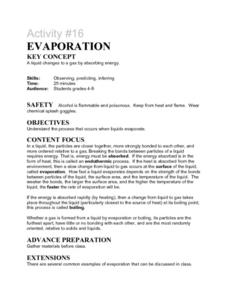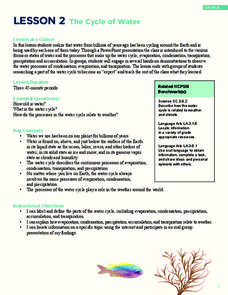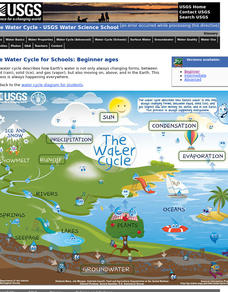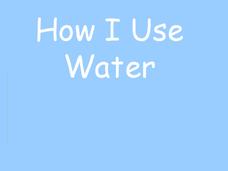American Chemical Society
Recrystallization Test
Crystallize the answer to the question that has been investigated since the first of four lessons: What is the unknown crystal? Pupils have examined, crushed, and dissolved four samples plus an unknown as an exploration of the properties...
National Wildlife Federation
When It Rains It Pours More Drought and More Heavy Rainfall
Which is worse — drought or flooding? Neither is helpful to the environment, and both are increasing due to climate change. The 16th lesson in a series of 21 covers the average precipitation trends for two different climates within the...
American Chemical Society
Energy Foundations
Only 10 percent of an incandescent bulb's energy is used to create light; the remaining 90 percent is heat. In the unit of activities, young chemists examine energy through hands-on activities, videos, discussions, and readings. Scholars...
Rice University
College Physics for AP® Courses
Take a look at an organized physics course. The 34-section electronic textbook covers material in AP® Physics 1 and 2. Teachers use the text to supplement lectures and have the class work through the labs. Each section contains multiple...
Curated OER
Science--"Water, Water Everywhere"--Exploring Liquids
In this water worksheet, students read a 1 page article on water, fill in the blanks of 3 words with their missing letters, fill in a crossword puzzle containing 5 clues about water and answer 1 short answer question. Students draw a...
Curated OER
Evaporation of Alcohol and Water
Students investigate the process that occurs when liquids evaporaate. They test water and alcohol to determine which substance evaporates more quickly and relate the rate to energy changes.
Curated OER
Evaporation and Condensation
Students explore how temperature effects the processes of evaporation and condensation and how the air may be polluted by the evaporation of certain compounds. In this temperature lesson students complete a lab and a worksheet.
NOAA
The Cycle of Water
Young water cycle enthusiasts discover the water they have been using has been cycling around the earth for billions of years. Through presentations, learners will understand that water has three states and how these forms fit into the...
Curated OER
Water Cycle Reading and Writing
Here is a great way to get pupils to express a scientific concept in a fun way. After hearing the story of Walter the Water drop and learning facts about the water cycle, the class will write a creative expository piece describing what...
US Geological Survey
The Water Cycle for Schools: Beginner Ages
Explore a day in the life of a water droplet. An interactive infographic helps scholars learn how water cycles work from precipitation all the way around to condensation. Learners hover over each step of the cycle to read more as they...
Curated OER
Physical Changes and States of Matter - Two
Here's a wonderful lesson on how substances change states. Groups of learners are given trays with a chocolate bar, a piece of paper, an ice cube, and a balloon. During the activity, the groups closely observe the changes that each...
Curated OER
How I Use Water
Beginning with a brief anticipatory set on how water is commonly used, this presentation evolves into a well planned lesson on the water cycle. Students will discuss vocabulary, label the parts of the water cycle, locate where water is...
Pennsylvania State University
Learn, Protect, and Promote Water
A hands-on activity helps learners explore the water cycle. After discussing how they use water, classes discuss water pollution and then move into a simulation where 20 pupils move through the water cycle based on description cards.
Curated OER
Gravimetric Determination of the Nonvolatile Content of Paint
Here are the instructions for leading your advanced chemists though the process of measuring the nonvolatile components in a sample of paint. No student handout is provided, so you may want to create one based on the procedure explained....
Curated OER
The Potential Consequences of Climate Variability and Change
Students analyze the impact of climate variability and change utilizing a broad span of topics over a wide range of grade levels. This three lesson unit is easily adapted for the various instructional levels listed.
Curated OER
I Just Drank George Washington's Water!
Guide your learners through the water cycle with this lesson plan. Over the course of the lesson, they read two Magic School Bus books, discuss the water cycle, come up with water facts, complete a diagram of the water cycle, recognize...
Graves County Schools
The Water (H2O) Cycle
Learners in elementary grades would love this colorful and informative presentation on the water cycle. Using pictures and diagrams, it makes the water cycle understandable. The bright colors the author chose for the slides should appeal...
Curated OER
The Water Cycle
A short, but nicely done, presentation on the basics of the water cycle. In it, learners view slides which describe the fascinating process of how the sun creates water vapor, which creates clouds, which create rain, which flows into...
American Chemical Society
Norbert Rillieux, Thermodynamics and Chemical Engineering
The man who invented the earliest examples of chemical engineering was an American-born, French-educated, free man of color before the Civil War, and went on to translate Egyptian hieroglyphics. There is something of interest for almost...
Curated OER
The Water Cycle
An inventive and interesting lesson plan on the water cycle (and other cycles associated with it), is here for you. After doing a well-designed hands-on inquiry in class, learners also identify organisms and processes that are involved...
Science Geek
Thermochemical Calculations
Viewers learn where the heat goes when phase changes take place with a presentation that explains the latent heat of phase changes, or, more specifically, the molar heat of fusion, solidification, vaporization, and condensation. The show...
Center for Learning in Action
Water—Changing States (Part 1)
Here is part one of a two-part lesson in which scholars investigate the changing states of water—liquid, solid, and gas. With grand conversation and up to three demonstrations, learners make predictions about what they think will happen...
Center for Learning in Action
Water – Changing States (Part 2)
Here is part two of a two-part activity in which scholars investigate the changing states of water—liquid, solid, and gas—and how energy from heat changes its molecules. With grand conversation, two demonstrations, and one hands-on...
Curated OER
Physical Changes and the Water Cycle - Three
Third graders observe and reproduce the water cycle in their very own classroom. A simple, yet very effective, demonstration on how water evaporates is observed by the young scientists. They make observations and sketches in their...

























